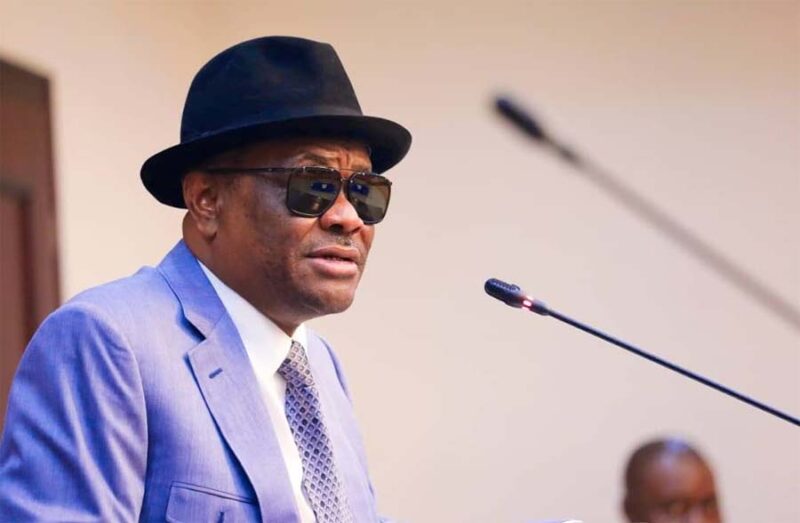News
Dangote refinery turns to US for crude oil supply

Dangote refinery turns to US for crude oil supply
There are indications that Dangote refinery is set to turn to the US in the forthcoming months for supply of constant crude oil for the refinery.
This development was announced by Bloomberg on Monday.
Nigeria, the home country of the 650,000 barres per day refinery has been battling with inability to meet crude oil production quota in the past few years occasioned by rising incidents of crude oil theft, divestment from oil majors and insecurity across the Niger Delta.
In recent times, Nigeria has failed to meet its OPEC production quota of 1.75 mbpd for 2023 necessitating the oil cartel to cut its production quota for 2024. Perhaps, Nigeria’s erratic crude oil production levels might be responsible for Dangote refinery to look elsewhere for consistency in crude oil supply.
These factors are said to be responsible for the decision of the refinery to turn to the US for sure supply of crude.
READ ALSO:
- Jetour X70 (Liberty) offers classy mid-size family SUV with innovative technologies
- Bank customer slumps, dies outside bank hall in Taraba
- 8,285 candidates register for maiden CB-WASSCE despite initial resistance
Already, traders’ familiar with the matter disclosed that Trafigura Group has sold 2 million barrels of WTI Midland to the Dangote refinery for delivery by the end of February. This marks the first time of the refinery buying non-Nigerian crude.
The exponential growth in US oil supply over the past decade has reshaped the global market, extending its influence to regions like Asia and Nigeria, whose economy heavily relies on petroleum exports, and will be particularly impacted by these transatlantic deliveries.
The new 650,000 barrel-a-day oil refinery commenced operations earlier this month. Initially targeting a processing rate of 350,000 barrels per day, the refinery aims to gradually escalate production towards its full capacity.
While the refinery primarily sources domestic crude through a supply agreement with the trading arm of the state-owned NNPCL, it recently received its first shipment of Nigeria’s Agbami crude, facilitated by a trading unit of Shell. Subsequent deliveries included Nigeria’s Amenam, Bonny Light, and CJ Blend streams.
In addition to handling domestic feedstock, the recently inaugurated mega-facility is capable of processing various African crudes, along with supplies from distant sources such as the US and Saudi Arabia, as disclosed by the Dangote Group earlier this month.
Dangote refinery turns to US for crude oil supply
News
‘Enough is enough’, Tinubu directs security chiefs to stop violent attacks

‘Enough is enough’, Tinubu directs security chiefs to stop violent attacks
President Bola Tinubu has ordered security operatives to end forthwith the violent attacks in some parts of the country, especially in Plateau, Borno, and Benue states.
He gave the directive during a meeting with security chiefs at the State House on Wednesday.
The meeting was attended by Nuhu Ribadu, the national security adviser (NSA); Mohammed Mohammed, director-general of the National Intelligence Agency (NIA); Emmanuel Undianeye, chief of defence intelligence; Oluwatosin Ajayi, director-general (DG) of the Department of State Services (DSS); and Femi Gbajabiamila, chief of staff (CoS) to the President.
Speaking with journalists after the meeting, Ribadu said Tinubu declared that “enough is enough” on the resurgence of violence in some parts of the country.
The NSA said the president directed security chiefs to work with the political authorities in states and at the grassroots level to find a lasting solution to the insecurity.
He said the security chiefs had acted on Tinubu’s previous instructions by meeting with political leaders in the affected communities and states.
The NSA said the meeting offered the security chiefs the opportunity to fully brief the president about the current security situation of the country.
“This time, we were able to sit with him for hours and give a proper briefing. We also took new instructions from him,” he said.
“Insecurity is not only a government problem.
“It also involves the subnational units — the communities, local governments, and especially the governors. The president directed that we work more closely with them.
“Some of these problems are community-related. While not entirely so, that element plays a significant role.
“Mr. President is working hard to ensure that Nigeria enjoys peace and stability. We are not relenting. We will not stop until we get the results he demands.”
On the resurgence of violent attacks in Borno, Ribadu said the terrorists were planting explosives during the period of relative peace in the state.
“This enemy does not give up easily. When there’s peace for a long time, they try to shock the public with an isolated incident,” he said.
The NSA said the security situation in the country is not yet at 100 percent, while noting that there is “significant improvement”.
Since the beginning of the month, many have been killed in some communities in Plateau State.
Benue State has also recorded violent attacks as over 50 people were killed in Ukum and Logo LGAs on April 18.
News
Minister queries Julius Berger’s exclusion from furnishing of Abuja Conference Centre

Minister queries Julius Berger’s exclusion from furnishing of Abuja Conference Centre
Minister of the Federal Capital Territory (FCT), Nyesom Wike, has questioned the exclusion of Julius Berger from furnishing the Abuja Conference Centre, despite the company being awarded the full rehabilitation contract in April 2024.
Wike made his position clear during an inspection visit to the project site on Wednesday in Abuja, as reported by the News Agency of Nigeria (NAN).
Last month, the minister announced that the N39 billion renovation was 70–80 percent complete.
He expressed confidence it would be ready for use by May, and among the projects to mark Tinubu’s second year in office.
While commending Julius Berger for the quality of work done so far, Wike said he was shocked to learn that the furnishing aspect of the project was handed over to a different company without his approval.
According to the minister, the original agreement was for Julius Berger to handle the complete rehabilitation of the Abuja International Conference Centre (AICC). He stated that he had personally approved the contract and the budget involved, and any deviation from that plan required official clearance.
“The work was going as expected, the only problem we identified this afternoon has to do with the furniture that will be in the conference hall.
“I was surprised to hear that there is a different contractor for that, which is unacceptable to us. The job was given to Julius Berger entirely. I cannot have different qualities,” Wike stated.
The FCT minister subsequently summoned the leadership of Julius Berger, Abuja Investment Company Ltd (AICL), and the Federal Capital Development Authority (FCDA) to clarify who authorised the deviation from the original contract and on what basis.
He said assigning different contractors to furnish separate sections of the same facility could compromise the overall quality and consistency of the project.
The Abuja International Conference Centre, built by Julius Berger Nigeria Plc in 1990 and completed in time for the 1991 OAU Heads of Government meeting, has long served as a venue for government functions, international summits, exhibitions, and corporate events.
Over the years, the facility deteriorated. In April 2024, President Tinubu ordered urgent renovations after calling its condition an “eyesore” during the ECOWAS Parliament inauguration. The FCT Administration suspended activities on April 8, allowing Julius Berger to begin extensive rehabilitation
News
Kaduna governor revokes land approved sold by El-Rufai

Kaduna governor revokes land approved sold by El-Rufai
Kaduna State Government has revoked institutional houses and plots of land sold in the state by the administration of former Governor Nasir El-Rufai.
Governor Uba Sani on Tuesday ordered the revocation of the properties within Alhuda-huda College, Zaria; Queen Amina College, Kaduna and Government Commercial College, Zaria.
Secretary to the State Government (SSG) Dr. AbdulKadir Mu’azu Meyere, who announced the revocation in a statement, said the decision was taken for overriding public interest and for the common good.
He said efforts were being made to ensure all payments made to the government coffers in respect of the sold houses are refunded.
He said, “In line with its commitment to human capital development and to ensure conducive atmosphere for teaching and learning in schools, the Kaduna State Government, under the leadership of His Excellency, Senator Uba Sani, had revoked all previous sales of institutional houses and land allocations within Alhuda-huda College, Zaria, Queen Amina College, Kaduna and Government Commercial College, Zaria for overriding public interest and for the common good.
“The revocation was approved last year and the revocation order has been conveyed to all allottees, while steps are being taken to refund amounts paid in respect of the sold houses as directed by His Excellency, the Governor of Kaduna State.
“As one of the key pillars of His Excellency’s Human Capital Development, Uba Sani noted that effective learning can best take place in a conducive atmosphere without distractions and sundry interferences.
“The governor has always argued that education is not just a leveler but also a ladder for upward mobility which can transform lives and improve livelihoods.
“To secure the future of our children, the Governor has been expanding access to education in the last two years, by bridging the infrastructural deficit at both primary and secondary schools across Kaduna State.
“In fact, one of the first decisions that His Excellency took upon assuming office was the slashing of the school fees of Kaduna State-own tertiary institutions on August 21, 2023.
“Apart from tertiary institutions, the Senator Uba Sani administration has also improved access by building new primary and secondary schools as well as blocks of classrooms since he became Governor of Kaduna State.
“Indeed, the Sani-led administration has built over 2,336 new classrooms, renovated more than 707 others and provided 3,704 and 30,742 furniture, for teachers and pupils.
“Similarly, Kaduna State Government, has sunk 51 boreholes, provided 918 cubicle toilets for both pupils’ and teachers’ use in all the Local Governments to make learning more conducive.”
-

 International3 days ago
International3 days agoBreaking: Pope Francis dies at 88 – Vatican
-

 metro1 day ago
metro1 day agoRivers: Tinubu meets with Fubara, may lift his suspension
-

 metro2 days ago
metro2 days agoBring your children to compete with mine, MC Oluomo challenges those mocking his spoken English
-

 metro3 days ago
metro3 days agoHow Nigerian hotelier died during wife’s 60th birthday celebration
-

 News2 days ago
News2 days agoTinubu returns to Nigeria after France, UK trip
-

 metro2 days ago
metro2 days agoAnsar-Ud-Deen Society of Nigeria elects new leaders, Tinubu praises educational contributions
-

 Business2 days ago
Business2 days agoMarketers count losses as NNPC slashes petrol price
-

 metro23 hours ago
metro23 hours agoI’m not in supremacy battle with Ooni, says new Alaafin







